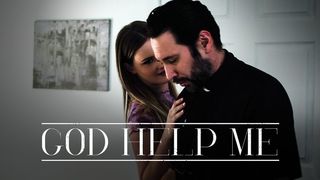
The Psychiatrist - Pure Taboo
SCENE opens on an close up of Sheila's face, as she staggers down the road. The 19-year-old girl looks dazed. Her face is sweaty. Her clothes are wet and loose, hanging off her petite frame, and she is clutching a bundle tightly against her chest. She comes upon a shed and, looking over her shoulder to make sure no one is around, carefully places the bundle between some rocks at the back of the structure. A WORM'S EYE angle shows her staring down at it. She slowly starts to cry. Wiping her tears, she composes herself and walks off. As she crosses the front of the shed, a man steps out and catches her. Surprised, he asks if she is OK. Not wanting to get caught, she runs off without saying a word, wiping the frame and leaving the man to wonder what she was doing behind his shed. He walks around the back to take look and, after a moment, lets out a scream. Close up of Sheila sitting stone-faced. She is handcuffed to a chair while a police officer stands silently behind her. A well-dressed man enters the room and approaches her. Putting his hand on her shoulder, he tells the officer to remove the cuffs and wait outside. When the officer exits, the man slowly removes his grip and sits down on a chair opposite Sheila. They survey each other for a moment before the man asks if she knows who he is. She has no reaction. The man introduces himself as Dr. Powell. He explains that he is a psychiatrist who has been appointed by the court in her case. She says nothing. Taking a deep breath, he asks if she knows why she is here. When she continues to be silent, he picks up his notebook and reads that she is here because of the June 7, 2017 incident involving her baby. Sheila looks away, to hide her reaction, and mutters something incoherent. Dr. Powell pulls his chair a little closer. He tells her that she has been charged with attempted homicide and, since she is 19-years-old, she is going to be tried as an adult. Her attorney, a public defender, is trying to build a case to prove it was involuntary abandonment. Right now, that defense is greatly dependent on this session. The psychiatrist's role will be to examine her and provide testimony about her mental state. His recommendations will provide the legal evidence that her attorney is hoping for -- proof that she was not of sound mind when committing the act. He asks if she knows the difference between voluntary and involuntary? Turning to face him for the first time, she says blankly 'Yes, I know the difference very well.' Sensing her resistance, Dr. Powell sits back in his chair and smiles. 'Involuntary is an unintential act committed by someone who has no spite or anger and no intention to cause harm.' He speaks condescendingly. 'It is very difficult to prove, especially in this kind of case, as I'm sure you know. But that's why we're here today ... so, why don't we start by you telling me what happened.' Sheila turns away. Dr. Powell licks his lips. 'How exactly did you get pregnant?' He asks. She says nothing. He stands up, adjusting himself subtly. 'Was it one of the boys from your school?' He asks, glancing at his notes. 'Oh wait ... you don't go to school. You haven't gone to school since ....' Sheila cuts him off and tells him that she's homeschooled. Walking around her, Dr. Powell asks her to elaborate -- what was it like to be taught by your parents instead of a regular teacher? Did it make you feel isolated to be away from other kids? Sheila stares down at her feet and tells him she wasn't taught by her parents. She was taught by her poppa. Dr. Powell stops walking. He licks his lips again, trying to contain the smirk forming on his face. 'Was your father a strict teacher?' He asks. Sheila looks up at him. 'My poppa is everything.' She replies and begins to cry.
Models:
Jill Kassidy
Tommy Pistol






































